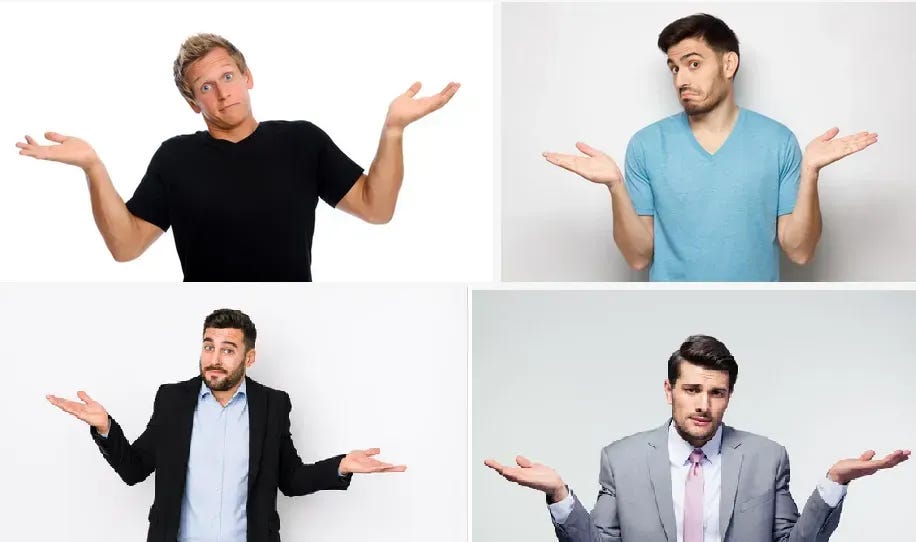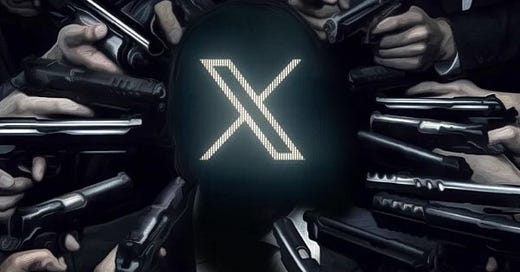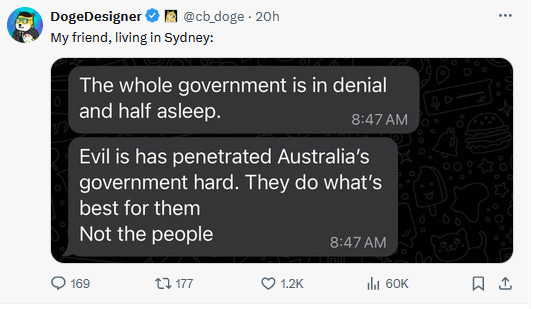For Free Speech to Survive, We Must Kill Twitter
The commodification of speech is harming our society. Is it possible to build an internet commons?
Being an Australian, it’s probably notable that I hardly talk about Australia very much at all and go on instead about Elon Musk and cultural and political trends coming out of America.
The fact is that Australian politics kind of bores me for the most part. I like that it’s boring, it’s less stressful (I say, conscious of the fact that I’m a middle class white dude). We have our problems, but there’s something to be said about the fact that our furthest-right political party are called the “Liberals.”
That’s confusing for Americans and it makes it difficult to write for a US audience about Australian politics but it’s not a paradox. Our mainstream politics is liberal. Our great right-left divide is a fight between the party of union reps and the party of department store middle managers. The capital-C Conservatives, our Republicans, are relegated to fringe parties with names like “One Nation,” “United Australia,” and “Family First.”
My interest in overseas politics came crashing into my backyard this week, however, when the Eye of Sauron himself finally turned on its wretched tower to cast a belligerent gaze toward me. Elon Musk, already knee-deep in the filth usually reserved for CIA special projects of trying to influence South American elections to friendlier autocrats, was tapped on the shoulder by Australian media regulators who wanted him to take down a video from Twitter of an Australian bishop being stabbed in the face.
If there’s one thing that will make Elon Musk point his finger and screech like a Body Snatcher it’s a request for censorship (under certain conditions—but I’ll get to that later). So he’s spent the past week dedicating a large chunk of his time focusing his legendary short temper on Australia and our tyrannical Stalinist regime, our nightmare dictatorship, the most radical and furthest left autocracy in the history of the world, and this is the same world that survived the Khmer Rouge.
Trust me, it is not that exciting.
The video that Musk is fighting to preserve and will probably try to unseat my government over is a few seconds long and it captures the moment an Assyrian Orthodox Christian bishop, Mar Mari Emmanuel, was stabbed by a Muslim youth during a Sydney service. I saw it the day it happened—I didn’t seek it out, it just got around as these things do. If you’re curious, it’s not very interesting. There’s no gore. You don’t even see a knife, looked just like a real solid haymaker to the face. Everyone survived.
But the government is going after it using the same laws they used to purge social media of the 2019 Christchurch massacre footage. Dampening, or trying to dampen, the incentive that people have to commit these ideologically driven atrocities specifically for the power they have in going viral.
Now, before anyone yells at me—as they do, often, every time I discuss anything regarding censorship—I’m not really for this. I’m not strictly against it, either. My heart doesn’t break for the attempted murderer’s inability to broadcast his message. I think though that the government’s policy on this is clumsy, a little too nannyish, and has the potential to break more than it fixes.
That said, Elon Musk’s attempts to lecture us, and ignorantly educate about us, are as pathetic and condescending and idiotic as every time an American pundit tells scary stories about us like we’re this terrible and impenetrable land of myth and horror. Suddenly all these jackasses have “a friend” living in Australia smuggling reports to them via Morse code about what it’s like living in fear under a Juche style military dictatorship. It’s fake and nauseating.
Musk can go on and on about how he’s trying to save Australia and he’s fighting for our right to see this video but the fact is that nobody here is actually that desperate to see it—it’s the Americans.
This type of propaganda, the spectacle of violence, is useful to Elon Musk for the reasons that it’s horrendous to us—its virality. It’s about the clicks. It’s about the spectacle. This is only disguised as a story about censorship. In reality it’s about the commodification of speech.
It’s obvious by now to anyone paying attention that Musk doesn’t really care much about speech. Nobody who is as obsessed with control as he is can really claim with a straight face that he’s primarily motivated by the freedom of other people. In acquiring Twitter, in part because he has long used it as a means of manipulating the public discourse, Musk has become a media baron on top of all the other hats he wears. Like any other media baron his business is in content curation.
Musk’s response to governments’ content moderation requests varies significantly depending on who’s asking. He’s strongly ideologically motivated and, for reasons that are really only known to him or more likely to the hypothetical therapist he famously avoids seeing, he’s extremely eager for the far right to take over pretty much every country in the world. His decisions are very visibly influenced by that fact.
He was more than happy to remove a documentary critical of the far right Prime Minister of India, Narenda Modi, and block the accounts of politicians, journalists, and activists who opposed him. However, when asked to do some account blocking earlier this year by the Brazilian government, he flipped his shit and stirred his entire personality cult into a fierce weeks long and ongoing tirade against the Brazilian government.
Why? Because the accounts he was asked to moderate on this occasion are loyalists of the ousted Brazilian President, Jair Bolsonaro, a close analogue to Donald Trump. Such an analogue that said loyalists performed a January 6 style insurrection to bring Bolsonaro back to power, a mission that Musk and his pet journalist and Twitter Files toadie Michael Shellenberger are keen to assist them with.
Similarly on the pro-censorship front, Musk has kowtowed to demands from Turkish President Erdoğan.
The difference is that Musk has business relationships and ideological agreements with Erdoğan and Modi that he doesn’t have with Brazil’s President Lula da Silva or Australia’s Prime Minister Anthony Albanese. That really is the core of the issue. A grotesque quid pro quo that uses the human right to free expression as a bargaining chip or a tool for blackmail to further Elon Musk’s ambitious plans for his own life. You want freedom? Elect the people friendly to me—or install them with violence if you must—and you can tweet away to your heart’s content.
Sorry, not tweet—post. I used the forbidden nomenclature.
Elon Musk is a very particular bastard, but he’s not a unique one. All of the social media platforms that currently exist on the internet are similarly shaped and operated. Proponents of free speech on platforms such as Twitter aren’t wrong about the fact that we need a town square, but too rarely do they raise a fuss about the fact that our town square is now privately owned, has a lock on the gate, and our speech is less free than it is regulated on a for-profit basis.
Those same proponents, the free speech absolutist or nearly-absolutist crowd, will usually also argue what choice do we have? You want the government to regulate social media? There’s 1984 reasons why that’s a terrible idea.
What options do we have, then, to interact ethically with our own communities in this landscape? Elon Musk doesn’t really want to help us have free speech and thrive in our collective liberty, he wants to engineer the discourse toward acceptance of his dystopian racist techno-feudalist vision and harvest a crazy shit ton of your money to fly to Mars and establish Space Rhodesia. Mark Zuckerberg isn’t much better, and Facebook’s moderation incompetence has assisted in at least one genocide, which isn’t a terrific note in its favour.
As Cam Wilson
said in his piece earlier this week:Being able to reach an audience is important to my theory of journalism — it’s about finding out things and telling it to as many people as possible so they can make good decisions — and, pragmatically, being on social media has helped me find stories, sources and jobs. Presumably other professions benefit too.
More importantly for “society”, I don’t want to be the reason that other people stay on bad sites nor do I want to help those bad sites continue to be bad by allowing them to monetize me etc. I think they’re hurting the way we interact with each other and promote the worst, most scared and hateful parts of ourselves.
Our social lives have failed in many ways to adapt to technology in ways such that the technology assists our life rather than taking control over it. Ever since we decided that the economic and sociopolitical framework of our society would be capitalism (or rather, it was decided for us), every aspect of our lived reality has been converted piece by piece and part by part into a series of business transactions with one corporation or another. At least we used to have ways to escape when we wanted to. The aforementioned town squares, public libraries, parks. These places still exist, to be sure, but increasingly our connections to the rest of society are moving online.
Every inch of online is commercial. It is all the property of one company or another, there is no personal property there and there is no commons. That means all of our speech is commodified. “Free speech” is not an ethos, it’s a logo. It’s an unlockable perk. It’s a subscription feature.
It's not as simple, as the boomers would have it, as putting our phones down and touching grass. The process has been happening for the better part of three decades now. And as much as I wish we could go back to the time when the internet was actually good, that’s just what old people have said about every aspect of culture since forever. If we’re going to make the internet good again then we’re going to have to lean into this social media thing.
That means we’re going to have to kill Twitter. And I mean kill it.
Back in 2022 when Musk bought Twitter and it became clear he wasn’t going to be a hands-off CEO a lot of people held onto hope that there was some way he could be ousted and the damage he’d done could be repaired. Now it becomes clear that even if that were still possible (and the chances of that are vanishingly small) it would still be undesirable. The Twitter X disaster has achieved exactly one good thing: It has shown us the light. It doesn’t matter who owns the platform. The problem is that someone owns the platform.
Free speech absolutists usually say that ideas live or die on the marketplace of ideas—an economic framing, so let’s continue along the same. A fair and free market is supposedly guided by an invisible hand. But on a platform like Twitter, the hand isn’t invisible at all, it’s attached to Elon Musk’s wrist. And it’s not impartial—he’s already selected the winning ideas, they’re the ones he agrees with.

The exact same thing can be said of any platform that is owned by people. Especially one or few people, and especially for profit, but it will always be like this because all people have some sort of belief or ideology, all people have their own personal version of an Overton window, and any human being is going to put their finger on the scale if they are in charge of a speech platform. There is no free marketplace of ideas in this situation.
One way that platform owners put their finger on the scale is by accepting their bias and leaning into it. This is sort of what Musk is doing. Another way is to lean too hard against it and try to create a false equilibrium by pretending that all ideas are equally popular to avoid anyone feeling targeted. That’s where you get, for example, Nazis on a platform where most people don’t want them so you have to protect them. That’s not a free market either.
I wrote about this once before in what I called the Hard Problem of Social Media, but the assumption that I was making in that piece was that a social media platform was always going to have an owner. But that doesn’t have to be the case, does it?
I think we’re forcing ourselves into a false frame where we view social media, the internet in general, and everything that it published on it as something that is inseparably commodified and capitalist, but we already have examples of how to interact with technology and speech and communication outside of that frame. After all, nobody owns the telephone.
Or perhaps a better analogy here is services like Zoom, Skype, Slack, and Teams that allow very large groups of people to congregate and communicate together. There is a company that owns that technology and that software, but they do not own your conversation in the same way that social media platform owners do. There are probably going to be rules for the group, but that’s true of any human interaction whether you’re at a house party or you’re chatting with your neighbour.
There are some ideas for what a Twitter-shaped free speech platform might look like. The tech editor Mike Masnick, incidentally the guy who coined the term “Streisand Effect,” wrote an influential article in 2019 titled "Protocols, Not Platforms,” which evidently inspired the platform Bluesky, which former Twitter CEO Jack Dorsey was going to actually merge with Twitter before he decided he liked money better.
For writers and creatives such as myself, the privatized social media landscape has been particularly brutal because these platforms are naturally antagonistic to self promotion of any kind (in a way, we act as direct competitors to the platform rather than contributors or users). This is how Facebook and Twitter helped kill the old media. For this I’m quite curious about what’s happening with something called ActivityPub, which is currently being set up to connect a number of media hubs like Ghost and Mastodon.
I don’t know what this post-privatised social media commons will look like, but I know that we have to kill Twitter to give birth to it. If you’ve noticed, I still haven’t been able to get used to calling it X, and it already feels like a lumbering corporate dinosaur. Despite Musk’s promises that it’s going to replace your bank and your dating apps and LinkedIn, he’s a man of many promises that so few people outside of his personality cult actually want, and it already feels like his project is crumbling under its own weight.
I can’t deny I’m going to enjoy seeing the look on his face when it sinks in for him what Twitter/X actually is:
Old media.















Thanks for explaining the Australian mainstream politics in two lines! As a new adopted Australian, your/our great right-left divide is weird and really cuts out a lot of the normal middle-class people. Also, on local news, every time the bishop stabbing was discussed there have been a lot of 'allegedly' thrown in there. I've seen the video and I agree, no gore at all for a stabbing, but 'alleged stabbing' seems a stretch.
Another excellent, on-point piece. Bravo.
Please give yourself a break from Musk and write about some Australian fun. What’s the deal with the platypus? Is Jim Jeffries the best you guys have to offer stand-up wise or do you have better? ✌️🇦🇺🇺🇸